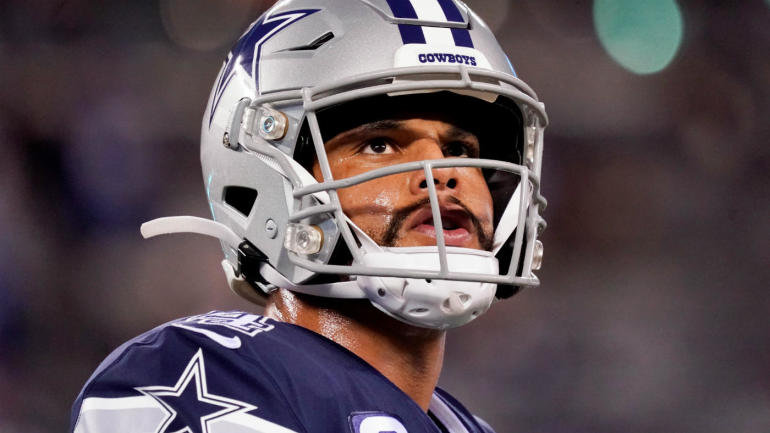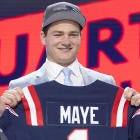
The clock is ticking for the Cowboys to get a long-term deal done with quarterback Dak Prescott. The 15-day period for teams to name franchise and transition players opened on Feb. 23. The Cowboys would prefer to sign Prescott to a new contract before this window closes on March 9 at 4 p.m. ET. Prescott is reportedly ahead of schedule in his recovery from the open or compound fracture and dislocation of his right ankle he sustained against the Giants five games into the 2020 season.
Absent a new deal, the Cowboys are expected to designate Prescott as franchise player for a second straight year. Presumably, Prescott would be given another exclusive designation, which would prevent him from soliciting an offer sheet from other NFL teams. A second franchise tag in 2021 at the NFL Collective Bargaining Agreement mandated 20 percent raise over the $31.409 million one-year contract Prescott played under in 2020 will cost Dallas $37,690,800.
Dallas accommodating a second franchise tag will be more challenging because the NFL and NFLPA agreed to a $180 million salary cap floor for 2021 league year, which begins on March 17, due to the coronavirus pandemic creating a revenue shortfall. The 2021 salary cap isn't expected to be above $185 million. Prescott's 2020 tag was 15.85 percent of the league wide $198.2 million salary cap. A $37,690,800 tag would be 20.94 percent of the salary cap at the $180 million floor. The Cowboys currently have $17.55 million of room, assuming the 2021 salary cap is set at the floor according to NFLPA data.
After the second designation, the Cowboys would have until 4 p.m. ET on July 15 to sign Prescott long-term. If an agreement couldn't be reached by this date, Dallas would be prohibited from signing Prescott to a multi-year contract until the 2021 regular season ends.
Prescott's leverage
The negotiation dynamics have changed since talks ended last July, which is something Cowboys owner Jerry Jones has acknowledged. "I don't know how you could have any more leverage," Jones said several weeks ago during a radio interview with 105.3 The Fan.
Prescott's importance to the Cowboys' offense and the franchise tag rules provide the leverage despite the injury. Prescott was having the best year of his career when he got he hurt. Through the quarter mark of the 2020 season, Prescott was on pace to shatter Peyton Manning's NFL single season passing yards record (5,477). Prescott was projecting to 6,760 passing yards for the season. He also completed a career high 68 percent of his passes in the five games he played.
Dallas struggled on offense without Prescott. In the four complete games Prescott played, he was throwing for 422.5 yards per game and the Cowboys were scoring 31.5 points per game. Dallas averaged 204.9 passing yards per game and 21.1 points per game when Prescott didn't play.
Prescott playing on a second franchise tag would set the stage for him to leave Dallas as an unrestricted free agent in 2022. Dallas designating Prescott as a franchise player for three consecutive years would be cost prohibitive. A third and final franchise tag with a 44 percent increase over the 2021 figure would be $54,274,752.
Teams rarely make the kind of statement Jones did about a negotiation. An admission like that is music to an agent's ears. As long as Prescott allows Todd France, his agent, to fully exploit his leverage, hardball can be played with the Cowboys.
Cowboys concessions
The only way something should get done before the March 9 deadline under these circumstances is with the Cowboys conceding every major aspect of the deal. These major aspects would be length of contract, average per year, contract guarantees, signing bonus and contract structure.
Dallas probably wouldn't take too kindly to France dictating the terms. My experience during my numerous years representing players was teams didn't hesitate to use leverage to the fullest extent but had a tendency to take it personally when an agent took complete advantage of his/her leverage.
Contract Length: The biggest sticking point in last year's negotiations was length of contract. The Cowboys were insistent on a five year deal while Prescott only wanted to sign for four years. If representing Prescott, I would be adamant about only signing a three-year deal with a second franchise tag imminent. My position would be Prescott wanted to be under contract through the 2023 season once his rookie contract expired. Insisting on a three-year deal after playing under a franchise tag in 2020 would be consistent with this thinking.
Average Yearly Salary: Ordinarily, the cost of franchising Prescott a second time, $37,690,800, would become the starting point for serious negotiations to France. The changing marketing conditions at quarterback since the failure to reach an agreement last July should be more significant. Disgruntled Texans quarterback Deshaun Watson signed a four-year, $156 million contract extension averaging $39 million per year last September as the start of the regular season was approaching. The deal is worth up to $160 million through incentives. Watson is the standard in first three new years compensation at $124 million, which averages $41,333,333 per year. Just as Watson topped Chiefs quarterback Patrick Mahomes in first four new years compensation, France should insist on the same for Prescott on the three year deal. Mahomes's new money average after four years is $38.95 million per year, which is $50,000 per year less than Watson's extension averages. Mahomes being the better player ultimately didn't matter with this contract metric. France should use the occurrence as ammunition since Watson is more highly regarded around the NFL than Prescott.
Contract Guarantees: The amount fully guaranteed at signing hasn't taken a jump since Falcons quarterback Matt Ryan become the NFL's first $30 million per year player in 2018. Ryan's deal contained $94.5 million fully guaranteed. Prescott's deal should establish a new benchmark. France could press for Prescott getting the most lucrative fully guaranteed contract in NFL history. It doesn't necessarily have to be a deal breaker for France provided any money that isn't fully guaranteed at signing becomes completely secure next March during the initial days of the 2022 league year.
Signing Bonus: It's probably going to be require structuring Prescott's deal with one of the biggest signing bonuses ever for the Cowboys to get substantial 2021 cap relief. Seahawks quarterback Russell Wilson's $65 million is the biggest signing bonus in league history. Packers quarterback Aaron Rodgers is next at $57.5 million. Adding two dummy or voiding years may also be necessary so that the proration of the signing bonus can be maximized. Dallas isn't opposed to using voiding contract years. Defensive end DeMarcus Lawrence and offensive tackle Tyron Smith have a voiding 2024 year in their restructured contracts.
Cash Flow: A neutral deal which isn't either front loaded or back loaded shouldn't be a consideration for Prescott. In a three-year neutral deal, Prescott gets 33.33 percent and 66.67 percent of the money respectively after the first and second contract years. A more player friendly cash flow should be a necessity for France. Getting cash flow percentages like in Falcons wide receiver Julio Jones' three-year extension aren't realistic. Jones has 65.11 percent and 82.56 percent of his new money after his first and second new contract years. He has the most front loaded contract in the NFL. Cash flow percentages similar what to Browns offensive tackle Jack Conklin has in the three-year, $42 million contract he signed during free agency last year seem more plausible. 47.62 percent of Conklin's money was in the first contract year. Conklin has 71.43 percent through the second contract year.
Sample three-year deal
Taking into consideration the issues that have been highlighted, below is a chart breaking down what Prescott's three-year contract could look like.
Signing Bonus: $60 Million
Guaranteed Money: $124.5 Million
Fully Guaranteed At Signing: $100 Million
Overall Dollars: $124.5 Million
Contract Length: 3 Years
Average Per Year: $41.5 Million
| Year | Base salary | Signing bonus proration | Salary cap number | Cash flow | Cash flow % |
|---|---|---|---|---|---|
2021* | $5,000,000 | $12,000,000 | $17,000,000 | $65,000,000 | 52.2% |
2022* | $22,500,000 | $12,000,000 | $34,500,000 | $87,500,000 | 70.28% |
2023** | $37,000,000 | $12,000,000 | $49,000,000 | $124,500,000 | 100% |
2024 (voids)+ | $41,500,000 | $12,000,000 | N/A | N/A | N/A |
2025 (voids)+ | $41,500,000 | $12,000,000 | N/A | N/A | N/A |
Note: $500,000 base salary de-escalator based on 90% workout program participation in 2021 through 2023 years.
* guaranteed for skill, injury and salary cap
** guaranteed for injury: $12.5 million guaranteed for skill, injury and salary cap; $24.5 million guaranteed for skill, injury and salary cap on 5th day of 2022 league year
+ voids on 23rd day prior to start of 2024 league year
Prescott's 2021 cap number is essentially cut by 55 percent under the deal relative to a second franchise tag thanks to the inclusion of voiding 2024 and 2025 contract years for proration purposes. Obviously, the signing bonus wouldn't be paid in one lump sum. Some of the $60 million signing bonus could be deferred into early 2022 if necessary since teams are not only constrained by the salary cap but have cash budgets. In no circumstance would Prescott make less in 2021 than a second franchise tag.
Prescott's 2021 cash flow percentage is slightly higher than Conklin's but drops below after two years. This is by design because of being sensitive to the $91,965,552 for Dallas to place second and third franchise tags on Prescott. The total cap savings over two years compared to continuing to play the franchise tag game is nearly $40.5 million.
There is a cost. If Prescott played out the contract, Dallas would have a $24 million cap charge in 2024 from the voiding years. The 23rd day before the 2024 league year starts is the voiding date in Lawrence and Smith's contracts. This voiding date would still allow for a franchise tag in 2024 although it may not be a viable option. It would be either $58.8 million or $70.56 million depending upon whether Prescott is actually given a second franchise tag this year. It would be the lower number if a 20 percent increase over his $49 million 2023 cap number and the higher number with a 44 percent increase.
Practically speaking, the contract would be putting the Cowboys in a similar situation as the Vikings have been with Kirk Cousins after signing him to a fully guaranteed three-year, $84 million deal (worth a maximum of $90 million through incentives), which at the time made him the league's highest paid player. Minnesota's tight salary cap and the way Cousins' contract was structured created leverage for him to get a new deal last offseason. He signed a two-year, $66 million extension creating just over $10 million of much needed cap relief for the Vikings. As long as Prescott is playing at a fairly high level, he would be in line for an extension in 2023 because of the adverse cap consequences of him completing the three-year contract.
Final thoughts
The contract is essentially Prescott having his cake and eating it too. Left to his own devices, France probably doesn't have an interest in compromising after the Cowboys dragged their feet on paying Prescott and taking care other players. France surely took note of Dallas rewarding Ezekiel Elliott's poor off-the-field choices by making him the league's highest paid running back in 2019 with two years remaining on his rookie contract after a lengthy preseason holdout. Linebacker Jaylon Smith was signed long term in 2019 when he would have been a restricted free agent in 2020 once his rookie contract expired. Offensive tackle La'el Collins, a 2015 undrafted free agent, also got his second lucrative veteran contract in 2019.
France having sympathy for the Cowboys' predicament with Prescott would be surprising. I know I wouldn't if I were representing Prescott. The best bet for any type of break financially is if Prescott's desire to remain in Dallas is stronger than the prospect of testing the open market next year or the injury making him reluctant to proceed without the security of a longer term deal as opposed to actually playing under another franchise tag.





















